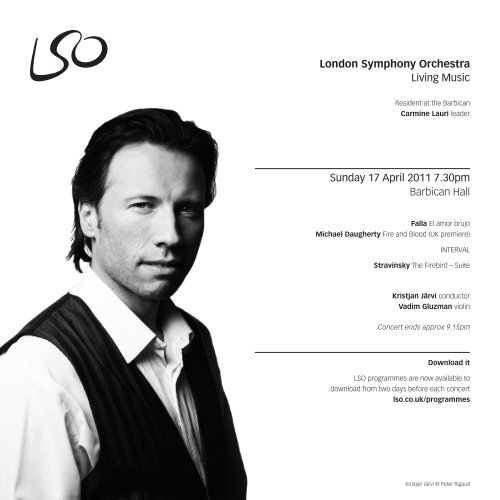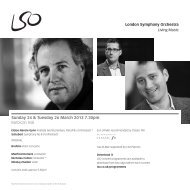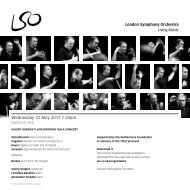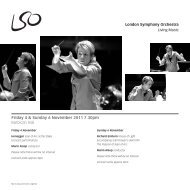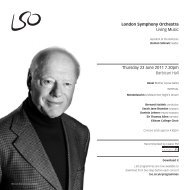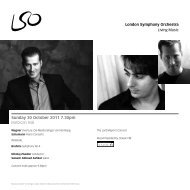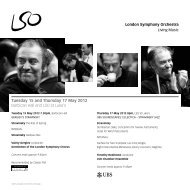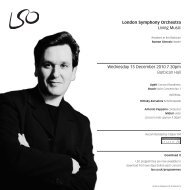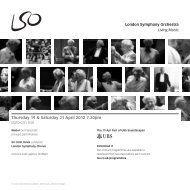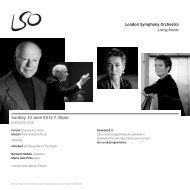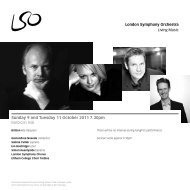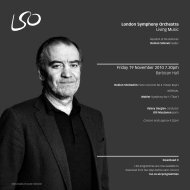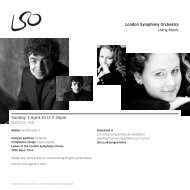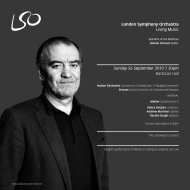Sunday 17 April programme - London Symphony Orchestra
Sunday 17 April programme - London Symphony Orchestra
Sunday 17 April programme - London Symphony Orchestra
You also want an ePaper? Increase the reach of your titles
YUMPU automatically turns print PDFs into web optimized ePapers that Google loves.
<strong>London</strong> <strong>Symphony</strong> <strong>Orchestra</strong><br />
Living Music<br />
Resident at the Barbican<br />
Carmine Lauri leader<br />
<strong>Sunday</strong> <strong>17</strong> <strong>April</strong> 2011 7.30pm<br />
Barbican Hall<br />
Falla El amor brujo<br />
Michael Daugherty Fire and Blood (UK premiere)<br />
INTERVAL<br />
Stravinsky The Firebird – Suite<br />
Kristjan Järvi conductor<br />
Vadim Gluzman violin<br />
Concert ends approx 9.15pm<br />
Download it<br />
LSO <strong>programme</strong>s are now available to<br />
download from two days before each concert<br />
lso.co.uk/<strong>programme</strong>s<br />
Kristjan Järvi © Peter Rigaud
Welcome News<br />
Welcome to this evening’s LSO concert at the Barbican conducted<br />
by Kristjan Järvi. The performance sees the continuation of the LSO’s<br />
spring/summer season of ‘Classic Tales’. Järvi will return to the LSO<br />
on <strong>Sunday</strong> 5 June for a concert performance of Bernstein’s brilliantly<br />
sardonic opera on Voltaire’s novel Candide.<br />
Violinist Vadim Gluzman makes his LSO debut this evening performing<br />
the UK premiere of Michael Daugherty’s Fire and Blood, and I am<br />
delighted to welcome Mr Daugherty who is in the audience tonight.<br />
I would like to take the opportunity to thank all of you for your continued<br />
support of the LSO. In times of reductions in public funding it is ever more<br />
important that the LSO is able to generate income from many different<br />
sources. Your commitment to our music-making is deeply appreciated<br />
and I hope that we can continue to count on your support.<br />
I hope you enjoy tonight’s performance and that you can join us<br />
for our next concert on 5 May when François-Xavier Roth conducts<br />
a <strong>programme</strong> of American classics and a new commission by Tim<br />
Garland, the well-known British jazz saxophonist and composer.<br />
Kathryn McDowell<br />
LSO Managing Director<br />
2 Welcome & News<br />
Classic Tales: music-making meets story-telling<br />
From now until the end of the season, the LSO presents a series<br />
of concerts that all have tales to tell. From this evening’s El amor brujo<br />
and The Firebird to Candide and A Midsummer Night’s Dream in June,<br />
join us for a collection of pieces that take as their inspiration some<br />
of the most sensational myths, fairytales and historical events ever<br />
committed to paper. Turn to page 10 for an article on the series.<br />
LSO Aftershock<br />
Straight after the Barbican concert on Thursday 5 May, the LSO will<br />
celebrate the launch of ‘Aftershock’. On the Stalls foyer, DJs Gabriel<br />
Prokofiev and Richard Lannoy will perform 20 minute sets of remixed<br />
classical sounds, inspired by the works being performed in concert<br />
moments beforehand: the classical, jazz, American and Cuban infused<br />
influences of Gershwin, Copland and Tim Garland. In between sets,<br />
there will be live acts with LSO musicians. The night will end at midnight<br />
with the bar open throughout.<br />
Find out more at lso.co.uk/aftershock<br />
Released this month on LSO Live: Gergiev’s Debussy<br />
Following LSO Live’s recent release of Walton’s Belshazzar’s Feast and<br />
<strong>Symphony</strong> No 1 with Sir Colin Davis, you can now buy the next release<br />
on the label: Debussy’s La mer, Jeux and Prélude à l’après-midi d’un<br />
faune recorded live at the Barbican with Valery Gergiev last year. Of<br />
La mer, The Independent says: ‘Gergiev and the LSO at their best: a<br />
sensual, supremely unhurried reading’.<br />
Find out more and buy your copy at lso.co.uk/lsolive<br />
Kathryn McDowell © Camilla Panufnik
Manuel de Falla (1876–1946)<br />
El amor brujo (Love, the Magician) (1914–15)<br />
1 Dance of Terror<br />
2 Ritual Fire Dance<br />
3 Dance of the Game of Love<br />
Manuel de Falla was one of the few Spanish composers to make an<br />
impact on the European musical scene. His father was Andalusian,<br />
his mother from Catalonia, so he inherited two different Iberian<br />
traditions – one the Arabic inflections of Moorish Spain, and the<br />
other, the lively, clean-cut, but still strongly nationalistic elements<br />
of the north.<br />
His 1914 ballet El amor brujo (Love, the Magician) represents a fusion<br />
of these two traditions. Falla conceived it as a ‘gitaneria’, with dances,<br />
songs and spoken dialogue, accompanied by a small instrumental<br />
ensemble, and featuring the Andalusian gypsy folk-singer Pastora<br />
Imperio, who danced and sang the main role. Then he rewrote it as<br />
a ballet score in two scenes, scored for a normal theatre orchestra<br />
with a substantial piano part.<br />
The story concerns a beautiful gypsy girl called Candelas who lives in<br />
the caves of the Sacromonte near Granada. Candelas has a problem –<br />
she is haunted by the ghost of her dead lover. Every time she is<br />
about to kiss her new boyfriend, the ghost has an inconvenient habit<br />
of popping up between them. Candelas expresses her terror in an<br />
agitated dance, but then decides she needs to exorcise her spectral<br />
stalker. She draws a magic circle on the ground and performs the<br />
celebrated ‘Ritual Fire Dance’ to ward off evil spirits. But when that<br />
doesn’t work she eventually remembers that her former boyfriend<br />
could never resist a pretty face, so she brings along her charming<br />
friend Lucia. Sure enough, the ghost is so smitten that he leaves<br />
Candelas and Carmelo to celebrate their happiness in the ‘Danza del<br />
juego de amor’ (Dance of the Game of Love).<br />
Programme note © Wendy Thompson<br />
Wendy Thompson is Executive Director of Classic Arts Productions,<br />
the major supplier of independent <strong>programme</strong>s to BBC Radio 3,<br />
including Private Passions and Classical Collection.<br />
<strong>London</strong> <strong>Symphony</strong> <strong>Orchestra</strong><br />
Living Music<br />
Kristjan Järvi in Season 11/12<br />
Sat 15 Oct 2011 7.30pm<br />
Steve Reich 75th<br />
Birthday Celebration<br />
Steve Reich<br />
Three Movements<br />
The Four Sections<br />
Clapping Music<br />
The Desert Music<br />
Kristjan Järvi conductor<br />
Synergy Vocals<br />
Thu 9 Feb 2012 7.30pm<br />
Bernstein<br />
John Adams Chairman Dances<br />
Bernstein Three Dance Episodes<br />
from ‘On the Town’<br />
Copland Clarinet Concerto<br />
Milhaud La création du monde<br />
Bernstein Prelude, Fugue and Riffs<br />
Ellington Harlem<br />
Kristjan Järvi conductor<br />
Eddie Daniels clarinet<br />
Tickets from £10 on sale now<br />
Box Office<br />
020 7638 8891 (bkg fee)<br />
lso.co.uk (reduced bkg fee)<br />
Programme Notes<br />
3
Michael Daugherty (b 1954)<br />
Fire and Blood (UK premiere) (2003)<br />
1 Volcano<br />
2 River Rouge<br />
3 Assembly Line<br />
Vadim Gluzman violin<br />
In 1932, Edsel Ford commissioned the Mexican modernist artist<br />
Diego Rivera (1886–1957) to paint a mural representing the<br />
automobile industry of Detroit. Rivera came to Detroit and worked<br />
over the next two years to paint four large walls of the inner courtyard<br />
at the Detroit Institute of Arts. His extraordinary Detroit Industry<br />
murals have inspired me to create my own musical fresco for violin<br />
and orchestra. It was Rivera himself who predicted the possibility of<br />
turning his murals into music, after returning from a tour of the Ford<br />
factories: ‘In my ears, I heard the wonderful symphony which came<br />
from his factories where metals were shaped into tools for men’s<br />
service. It was a new music, waiting for the composer ... to give it<br />
communicable form’.<br />
Volcano<br />
Before coming to Detroit, Rivera lived in Mexico City surrounded by<br />
volcanoes. Fire is an important element in his murals, which depict<br />
the blaze of factory furnaces like erupting volcanoes. Volcanic fire was<br />
also associated with revolution by Rivera, an ardent member of the<br />
Mexican Communist party. He saw the creation of the Detroit murals<br />
as a way to further his revolutionary ideas. The music of the first<br />
movement responds to the fiery furnaces of Rivera’s imagination.<br />
The violinist plays virtuosic triple stops (three strings at once), while the<br />
orchestra explodes with pulsating energy. The composition alternates<br />
between repeated patterns in a complex 7/4 time and polytonal<br />
passages that occur simultaneously in different tempos. It concludes with<br />
an extended violin cadenza accompanied by marimba and maracas.<br />
River Rouge<br />
At the Ford River Rouge Automobile Complex, located next to the<br />
Detroit River, Rivera spent many months creating sketches of workers<br />
and machinery in action. He was accompanied by his young wife,<br />
the remarkable Mexican painter Frida Kahlo (1906–54). She lived<br />
in constant pain as a result of polio in childhood and a serious bus<br />
4 Programme Notes<br />
accident at the age of 18 in Mexico City. Many of her self-portraits<br />
depict the suffering of her body. During her time with Rivera in Detroit,<br />
Kahlo nearly died from a miscarriage, as depicted in paintings such as<br />
Henry Ford Hospital and My Birth. The colour of blood is everywhere<br />
in these works. She also had a passionate and playful side: she loved<br />
wearing colourful traditional Mexican dresses and jewellery, drinking<br />
tequila and singing at parties. Kahlo’s labours, grief and zeal for life<br />
added another perspective to Rivera’s industry. This movement is<br />
dedicated to Frida Kahlo’s spirit. The solo violin introduces two main<br />
themes. The first theme is dissonant and chromatic, flowing like a red<br />
river of blood. The second is a haunting melody that Kahlo herself<br />
might have sung, longing to return to her native Mexico. The orchestra<br />
resonates with floating marimbas and string tremolo, echoing like a<br />
mariachi band in the distance. The orchestration is colourful, like the<br />
bright tapestries of her dress. While death and suffering haunt the<br />
music, there is an echo of hope.<br />
Assembly Line<br />
Rivera described his murals as a depiction of ‘towering blast furnaces,<br />
serpentine conveyor belts, impressive scientific laboratories, busy<br />
assembly rooms; and all the men who worked them all’. Rather than<br />
pitting man against machine, Rivera thought the collaboration of<br />
man and machine would bring liberation for the worker. The violin<br />
soloist in this final movement is like the worker, surrounded by a<br />
mechanical orchestra. The music is a roller coaster ride on a conveyor<br />
belt, moving rapidly. This perpetual motion is punctuated by pizzicato<br />
strings, percussive whips, and brassy cluster chords. The percussion<br />
section plays factory noises on metal instruments like brake drums<br />
and triangles, and a ratchet turns like the wheels of the machinery.<br />
In addition to this acceleration of multiple mechanical rhythms, the<br />
musical phrasing recalls the undulating wave pattern that moves from<br />
panel to panel in Rivera’s mural.<br />
Fire and Blood was commissioned by the Detroit <strong>Symphony</strong> <strong>Orchestra</strong>,<br />
which gave the world premiere under Neeme Järvi in 2003.<br />
Programme note © Michael Daugherty
Diego Rivera (1886–1957)<br />
Detroit Industry (1932–33)<br />
Michael Daugherty (b 1954)<br />
Composer Profile<br />
One of the most prolific composers on the US music scene today,<br />
Michael Daugherty’s works are rich with cultural allusions and bear<br />
the stamp of classic modernism with colliding tonalities and blocks<br />
of sound, whilst at the same time his melodies can be eloquent<br />
and stirring. Daugherty first came to international attention when<br />
the Baltimore <strong>Symphony</strong> <strong>Orchestra</strong>, conducted by David Zinman,<br />
performed his Metropolis <strong>Symphony</strong> at Carnegie Hall in 1994. Since<br />
then, his music has made him one of the most performed living<br />
composers in the US.<br />
Most recently, a recording of Daugherty’s Metropolis <strong>Symphony</strong> and<br />
Deus ex Machina performed by Nashville <strong>Symphony</strong> gained three<br />
Grammy Awards, including Best Classical Contemporary Composition.<br />
Alongside this Naxos also released Route 66, featuring Daugherty’s<br />
orchestral music with Marin Alsop conducting Bournemouth <strong>Symphony</strong>.<br />
Born in 1954 in Iowa, Daugherty is the son of a dance-band drummer<br />
and the oldest of five brothers, all professional musicians. He studied<br />
composition at the University of North Texas, the Manhattan School<br />
of Music, computer music at Pierre Boulez’ IRCAM in Paris, and<br />
later received his doctorate from Yale University in 1986. During this<br />
time he collaborated with jazz arranger Gil Evans in New York and<br />
pursued further studies with composer György Ligeti in Hamburg.<br />
After teaching composition from 1986–90 at the Oberlin College<br />
Conservatory of Music, Daugherty became a Professor of Composition<br />
at the University of Michigan School of Music in 1991.<br />
Daugherty has received numerous awards and fellowships including<br />
a Fulbright Fellowship, Kennedy Center Friedheim Award, fellowships<br />
from the National Endowment for the Arts and the Guggenheim<br />
Foundation and the Stoeger Prize from the Chamber Music Society<br />
of Lincoln Center. In 2005 he received the Lancaster <strong>Symphony</strong><br />
<strong>Orchestra</strong> Composer’s Award (Pennsylvania) and in 2007, the<br />
Delaware <strong>Symphony</strong> <strong>Orchestra</strong> selected Daugherty as the winner of<br />
the A I DuPont Award. Daugherty has been named Outstanding Classical<br />
Composer at the Detroit Music Awards in 2007, 2009 and 2010.<br />
Programme Notes<br />
5
Igor Stravinsky (1882–1971)<br />
The Firebird – Suite from the ballet (1945)<br />
1 Introduction – The Firebird and its Dance – Variation<br />
2 Pantomime I<br />
3 Pas de deux (Firebird and Tsarevich Ivan)<br />
4 Pantomime II<br />
5 Scherzo: Dance of the Princesses<br />
6 Pantomime III<br />
7 Rondo: The Princesses’ Khorovod<br />
8 Infernal Dance of Kashkei<br />
9 Lullaby of the Firebird<br />
10 Final Hymn<br />
The Firebird was Stravinsky’s first commission for Serge Diaghilev’s<br />
Ballet Russes. Having settled on the exotic Russian folk-tale of<br />
the magical Firebird as a suitable ballet subject and extracted a<br />
scenario from his choreographer Mikhail Fokine, Diaghilev took<br />
the bold step of approaching Stravinsky, then a young and virtually<br />
unknown composer. His gamble paid dividends. The Firebird<br />
was first performed on 25 June 1910 at the Paris Opéra, with the<br />
great ballerina Tamara Karsavina in the title role. Opulent decor,<br />
choreography and Stravinsky’s luminous score made The Firebird<br />
an instant hit, and it remained the mainstay of the Russian Ballet’s<br />
repertory until its disbandment.<br />
Stravinsky later made three orchestral suites from the ballet, in 1911,<br />
1919 and 1945. The last of these was based on the 1919 version,<br />
in which Stravinsky – in tune with post-war austerity – had reduced<br />
the colossal orchestra. However, to the five movements of the 1919<br />
version, Stravinsky now added five more numbers taken from the<br />
original score, partly to make a more versatile alternative concert<br />
or stage version of the ballet, and also to protect his copyright,<br />
following a successful lawsuit brought by the original Russian<br />
publisher of the score.<br />
A mysterious Introduction introduces the Firebird, who performs her<br />
Dance and Variation. Prince Ivan captures her, and after a brief linking<br />
section called ‘Pantomime’ they perform a pas de deux. Ivan releases<br />
the Firebird in exchange for one of her magic feathers. Another short<br />
linking passage takes him to the magician Kashkei’s palace, where<br />
6 Programme Notes<br />
he finds himself surrounded by captive princesses (‘Scherzo: Dance<br />
of the Princesses’), and falls in love with the most beautiful of them.<br />
After a further linking passage the princesses perform a Round Dance,<br />
but Kashkei and his minions arrive and take Ivan prisoner in an exotic<br />
Infernal Dance. Ivan uses his magic feather to summon the Firebird,<br />
who puts Kashkei and his retinue to sleep in a hypnotic Lullaby. In the<br />
Finale, Ivan destroys the magic egg shell in which Kashkei keeps his<br />
evil soul. The spell is broken, the captives are freed, and the Prince<br />
marries his chosen princess in a radiant, hymn-like epithalamium.<br />
Programme Note © Wendy Thompson<br />
Valery Gergiev’s Stravinsky next season with the LSO<br />
Fri 11 May 2012 7.30pm<br />
Stravinsky Mass; Concerto in D major;<br />
The Firebird – complete ballet<br />
with Leonidas Kavakos violin<br />
<strong>London</strong> <strong>Symphony</strong> Chorus<br />
Sun 13 May 2012 7.30pm<br />
Stravinsky Renard; The Soldier’s Tale<br />
with LSO Chamber Ensemble<br />
Tue 15 May 2012 7.30pm<br />
Stravinsky The Rite of Spring; Oedipus Rex<br />
with Gentlemen of the <strong>London</strong> <strong>Symphony</strong> Chorus<br />
Thu <strong>17</strong> May 2012 8pm, LSO St Luke’s<br />
UBS Soundscapes: Eclectica – Stravinsky<br />
with LSO Chamber <strong>Orchestra</strong><br />
Sun 15 Jul 2012 7.30pm<br />
Stravinsky Petrushka<br />
Tickets from £10<br />
Box Office 020 7638 8891 (bkg fee)<br />
lso.co.uk (reduced bkg fee)
Kristjan Järvi<br />
Conductor<br />
Estonian-born and American-raised,<br />
conductor Kristjan Järvi is a unique musical<br />
personality pushing classical music borders<br />
with fresh ideas, charisma and technical<br />
prowess. His name has become synonymous<br />
with artistic and cultural diversity, embodied<br />
in his roles as Artistic Advisor to the Basel<br />
Chamber <strong>Orchestra</strong> and Founder and Music<br />
Director of New York’s Absolute Ensemble.<br />
His imaginative programming has been<br />
embraced by leaders of classical, jazz and<br />
world music spheres alike. Järvi’s authentic<br />
commitment to all genres is reflected in<br />
his collaborations with Arvo Pärt, Tan Dun,<br />
John Adams, Esa-Pekka Salonen, HK Gruber,<br />
Renée Fleming, Joe Zawinul, Benny Andersson,<br />
Goran Bregovic, Paquito d’Rivera, Eitetsu<br />
Hayashi and Marcel Khalife.<br />
Kristjan Järvi has actively sought the<br />
commission of over 100 new works.<br />
Premieres in the 2009/10 Season included<br />
works by Indian composer Nitin Sawhney<br />
with the <strong>London</strong> <strong>Symphony</strong> <strong>Orchestra</strong>,<br />
Daniel Schnyder with the Lausanne Chamber<br />
Kristjan Järvi © Peter Rigaud<br />
<strong>Orchestra</strong>, James MacMillan with the <strong>London</strong><br />
<strong>Symphony</strong> <strong>Orchestra</strong> and Tim Garland with<br />
the City of Birmingham <strong>Symphony</strong> <strong>Orchestra</strong>.<br />
Kristjan Järvi is a dynamic and enterprising<br />
music educator. He is Founding Conductor<br />
and Music Director of the Baltic Youth<br />
Philharmonic. With the support of former<br />
German chancellor Schroeder, Valery Gergiev,<br />
Kurt Masur, Esa-Pekka Salonen, Marek<br />
Janowski and Mariss Jansons, the Baltic Youth<br />
Philharmonic aims to become an education<br />
and performance hub for the Baltic region.<br />
Kristjan Järvi is highly sought after as<br />
a conductor. He appears regularly and<br />
exclusively in <strong>London</strong> with the <strong>London</strong><br />
<strong>Symphony</strong> <strong>Orchestra</strong>, with which he<br />
toured the US, Europe and Asia in the<br />
2009/10 season. Further guest conducting<br />
engagements in this and last season include<br />
concerts with the Dresden Staatskapelle,<br />
Bayerische Rundfunk <strong>Symphony</strong> <strong>Orchestra</strong>,<br />
Gewandhaus <strong>Orchestra</strong> Leipzig, NDR Hamburg,<br />
Frankfurt Radio <strong>Symphony</strong> <strong>Orchestra</strong>,<br />
Danish National Radio <strong>Symphony</strong> <strong>Orchestra</strong>,<br />
Orchestre National de France, Orchestre<br />
de Paris, Accademia Nazionale di Santa<br />
Cecilia Rome, National <strong>Symphony</strong> <strong>Orchestra</strong><br />
(Washington DC), Sydney <strong>Symphony</strong>, and<br />
NHK <strong>Symphony</strong> Japan.<br />
Kristjan Järvi is also a passionate recording<br />
artist with 30 albums to his name. He has<br />
received a list of accolades, including<br />
a Swedish Grammy for Best Opera<br />
Performance, the German Record Critics Prize<br />
for Best Album and a Grammy Nomination.<br />
The 2009 Chandos release of Bernstein’s epic<br />
Mass was met with widespread acclaim<br />
and was Gramophone magazine’s Editor’s<br />
Choice. Other recent releases include<br />
Haydn’s ‘Paris’ Symphonies, Schmidt’s<br />
Das Buch mit Sieben Siegeln, Mahler’s<br />
arrangement of Beethoven <strong>Symphony</strong> No 9,<br />
Mendelssohn’s A Midsummer Night’s Dream;<br />
and Absolute Zawinul, the late Joe Zawinul’s<br />
last studio recording.<br />
An accomplished pianist, Kristjan Järvi<br />
studied piano at the Manhattan School<br />
of Music and conducting at the University<br />
of Michigan. In 2007 Musikfest Bremen<br />
honoured Kristjan Järvi and the Absolute<br />
Ensemble with the Deutsche Bank Prize<br />
in recognition of Outstanding Artistic<br />
Achievement.<br />
The Artists<br />
7
Vadim Gluzman<br />
Violin<br />
Vadim Gluzman, lauded by both critics and<br />
audiences as a performer of great depth,<br />
virtuosity and technical brilliance, has<br />
appeared throughout the world as a soloist<br />
and in a duo setting with his wife, pianist<br />
Angela Yoffe. He appears regularly with major<br />
orchestras such as the <strong>London</strong> Philharmonic,<br />
Chicago <strong>Symphony</strong>, Israel Philharmonic,<br />
San Francisco, Cincinnati, Detroit, Houston,<br />
Vancouver and Seattle <strong>Symphony</strong> orchestras,<br />
Royal Scottish National <strong>Orchestra</strong>, Deutsches<br />
Symphonie Orchester Berlin, Minnesota<br />
<strong>Orchestra</strong>, Munich, Dresden and Czech<br />
Philharmonic orchestras, the Stuttgart Radio<br />
<strong>Orchestra</strong>, NHK and KBS orchestras, among<br />
others.<br />
Gluzman has collaborated with some of<br />
the world’s most prominent conductors,<br />
including the late Yehudi Menuhin, Neeme<br />
Järvi, Andrew Litton, Marek Janowski, Itzhak<br />
Perlman, Peter Oundjian, Paavo Järvi, Rafael<br />
Frühbeck de Burgos, Yan Pascal Tortelier<br />
and Hannu Lintu. He has also performed<br />
at many festivals such as Verbier, Ravinia,<br />
Lockenhaus, Pablo Casals, Colmar, Jerusalem,<br />
the Schwetzinger Festspiele and Festival de<br />
Radio France.<br />
In Summer 2010 Vadim Gluzman appeared<br />
at Ireland’s West Cork Chamber Music<br />
Festival and at Music in the Mountains<br />
Festival in Colorado, as well as with the<br />
Pacific <strong>Symphony</strong>, the Minnesota <strong>Orchestra</strong><br />
(Minnesota <strong>Orchestra</strong> Sommerfest) and the<br />
Prague Radio <strong>Symphony</strong> <strong>Orchestra</strong>.<br />
During this season, Vadim Gluzman performs<br />
throughout the US, Australia, Canada, the UK<br />
and across Europe. Among the highlights<br />
of the season are his recital debut at<br />
Wigmore Hall, a tour of Australia, a tour<br />
with the Orpheus Chamber <strong>Orchestra</strong> that<br />
includes a performance at Carnegie Hall,<br />
and appearances with the San Francisco<br />
and Toronto symphony orchestras.<br />
A highly acclaimed recording artist, Vadim<br />
Gluzman’s recordings are released exclusively<br />
on BIS Records. His most recent album,<br />
featuring Korngold’s Violin Concerto as well<br />
as a Concerto by Lithuanian composer Balys<br />
Dvarionas with Neeme Järvi conducting was<br />
selected Disc of the Month by Classics Today<br />
on its release. A recording of Bernstein’s<br />
Serenade, Barber’s Violin Concerto and<br />
Bloch’s Baal Shem Suite with the São Paolo<br />
<strong>Symphony</strong> <strong>Orchestra</strong> conducted by John<br />
Neschling was chosen by The Strad magazine<br />
as a Selection of the Month.<br />
Other recordings include the Glazunov and<br />
Tchaikovsky violin concertos with Andrew<br />
Litton conducting the Bergen Philharmonic<br />
(a Classic FM magazine Disc of the Month<br />
as well as a Selection of the Month by<br />
The Strad magazine), and Fireworks, a<br />
collection of virtuoso violin show pieces.<br />
Born in 1973 in the Ukraine, Vadim Gluzman<br />
began studying the violin at the age of seven.<br />
Before moving to Israel in 1990, he studied<br />
under Roman Sne, Zakhar Bron and later<br />
under Yair Kless in Tel Aviv. He also studied<br />
in the US with Arkady Fomin and at The<br />
Juilliard School with the late Dorothy DeLay<br />
and Masao Kawasaki. Early in his career, he<br />
enjoyed the encouragement and support<br />
of Isaac Stern and in 1994 he received the<br />
prestigious Henryk Szeryng Foundation<br />
Career Award. Vadim Gluzman plays a 1690<br />
ex-Leopold Auer Stradivari, on extended<br />
loan to him through the generosity of the<br />
Stradivari Society of Chicago.<br />
8 The Artists Vadim Gluzman © John Kringas
On stage<br />
First Violins<br />
Carmine Lauri Leader<br />
Lennox Mackenzie<br />
Nicholas Wright<br />
Ginette Decuyper<br />
Jörg Hammann<br />
Michael Humphrey<br />
Maxine Kwok-Adams<br />
Claire Parfitt<br />
Colin Renwick<br />
Ian Rhodes<br />
Sylvain Vasseur<br />
Julia Rumley<br />
Erzsebet Racz<br />
Gabrielle Painter<br />
Gordon Mackay<br />
Hilary Jane Parker<br />
Second Violins<br />
Evgeny Grach<br />
Thomas Norris<br />
Miya Väisänen<br />
Matthew Gardner<br />
Iwona Muszynska<br />
Philip Nolte<br />
Andrew Pollock<br />
David Worswick<br />
Katerina Mitchell<br />
Deborah Gruman<br />
Hazel Mulligan<br />
Stephen Rowlinson<br />
Samantha Wickramasinghe<br />
Victoria Hands<br />
Violas<br />
Paul Silverthorne<br />
Gillianne Haddow<br />
German Clavijo<br />
Lander Echevarria<br />
Richard Holttum<br />
Robert Turner<br />
Jonathan Welch<br />
Natasha Wright<br />
Michelle Bruil<br />
Elizabeth Butler<br />
Caroline O’Neill<br />
Anna Dorothea Vogel<br />
Cellos<br />
Timothy Hugh<br />
Jesper Svedberg<br />
Alastair Blayden<br />
Jennifer Brown<br />
Mary Bergin<br />
Noel Bradshaw<br />
Daniel Gardner<br />
Keith Glossop<br />
Minat Lyons<br />
Penny Driver<br />
Double Basses<br />
Colin Paris<br />
Nicholas Worters<br />
Patrick Laurence<br />
Michael Francis<br />
Thomas Goodman<br />
Jani Pensola<br />
Paul Sherman<br />
Rupert Ring<br />
Flutes<br />
Gareth Davies<br />
Eilidh Gillespie<br />
Piccolo<br />
Sharon Williams<br />
Oboes<br />
Gordon Hunt<br />
Ruth Contractor<br />
Cor Anglais<br />
Christine Pendrill<br />
Clarinets<br />
Chris Richards<br />
Chi-Yu Mo<br />
Bassoons<br />
Daniel Jemison<br />
Christopher Gunia<br />
Horns<br />
Timothy Jones<br />
Angela Barnes<br />
Jonathan Lipton<br />
Estefanía Beceiro Vazquez<br />
Hugh Seenan<br />
Trumpets<br />
Philip Cobb<br />
Gerald Ruddock<br />
Trombones<br />
Katy Jones<br />
James Maynard<br />
Bass Trombone<br />
Paul Milner<br />
Tuba<br />
Patrick Harrild<br />
Timpani<br />
Nigel Thomas<br />
Percussion<br />
Neil Percy<br />
David Jackson<br />
Antoine Bedewi<br />
Sam Walton<br />
Harp<br />
Karen Vaughan<br />
Piano<br />
John Alley<br />
LSO String<br />
Experience Scheme<br />
Established in 1992, the<br />
LSO String Experience<br />
Scheme enables young string<br />
players at the start of their<br />
professional careers to gain<br />
work experience by playing in<br />
rehearsals and concerts with<br />
the LSO. The scheme auditions<br />
students from the <strong>London</strong><br />
music conservatoires, and 20<br />
students per year are selected<br />
to participate. The musicians<br />
are treated as professional<br />
’extra’ players (additional to<br />
LSO members) and receive<br />
fees for their work in line with<br />
LSO section players. Students<br />
of wind, brass or percussion<br />
instruments who are in their<br />
final year or on a postgraduate<br />
course at one of the <strong>London</strong><br />
conservatoires can also<br />
benefit from training with LSO<br />
musicians in a similar scheme.<br />
The LSO String Experience<br />
Scheme is generously<br />
supported by the Musicians<br />
Benevolent Fund and Charles<br />
and Pascale Clark.<br />
List correct at time of<br />
going to press<br />
See page xv for <strong>London</strong><br />
<strong>Symphony</strong> <strong>Orchestra</strong> members<br />
Editor Edward Appleyard<br />
edward.appleyard@lso.co.uk<br />
Print<br />
Cantate 020 7622 3401<br />
Advertising<br />
Cabbell Ltd 020 8971 8450<br />
The <strong>Orchestra</strong><br />
9
Classic Tales<br />
Music-making meets story-telling this spring and summer at the LSO<br />
Music is generally considered to be a more abstract art than painting<br />
or sculpture. But the earliest Western music was originally allied to<br />
words, and once composers discovered how the expressive and<br />
affective qualities of music could enhance and reflect the meaning of<br />
words, it was a short step to realising that purely instrumental music<br />
could evoke images from the real world, such as the sounds of battle<br />
or the hunt, the cries of birds and animals, the rippling of water, the<br />
slithering of skaters on a frozen pond.<br />
By the early 19th century, with a greatly expanded instrumental<br />
palette at their disposal, composers became more innovative in their<br />
alliance of music to story-telling. Beethoven’s ‘Pastoral’ <strong>Symphony</strong><br />
and Berlioz’s extraordinary Symphonie fantastique paved the way for<br />
the tone-poem and other 19th- and 20th-century orchestral genres<br />
which portrayed legendary or historical people and events, as well<br />
as natural phenomena. Tonight’s concert, and three others coming<br />
up, all show how music can illustrate narrative, whether romanticised<br />
versions of the life-stories of real people (Tsar Ivan IV of Russia, the<br />
Wild Western outlaw Billy the Kid, the Mexican artists Diego Rivera<br />
and Frida Kahlo), folk or fairy tales (Aladdin, Peer Gynt, Mother Goose,<br />
The Firebird), or stories concerning ritual and magic (El amor brujo,<br />
Fire and Blood, A Midsummer Night’s Dream).<br />
lso.co.uk/classictales<br />
10 Classic Tales<br />
Prokofiev’s score for Eisenstein’s epic 1940s film Ivan the Terrible<br />
brings to life scenes from the reign of the 16th-century Russian<br />
autocrat who created a vast empire out of disparate multi-ethnic<br />
Asiatic regions, and became the first Tsar of all the Russias. Prokofiev’s<br />
music evokes the grandeur and terror attending the birth of a nation,<br />
with brutal battle scenes, liturgical processions, drinking and wedding<br />
songs rubbing shoulders with broad folksong-based melodies<br />
representing the endless steppes of the emergent Motherland.<br />
Sun 3 Apr<br />
Prokofiev Violin Concerto & Ivan the Terrible – oratorio<br />
Xian Zhang conductor | Leila Josefowicz violin | LSC<br />
Processions, dances and celebrations also feature in two Nordic<br />
suites drawn from theatrical music (7 <strong>April</strong>) – one, tinged with<br />
sensuous Oriental exoticism, that the Danish composer Carl Nielsen<br />
made from his 1919 stage music to Aladdin and the Wonderful Lamp<br />
(the well-known story taken from the 1001 Nights), and another from<br />
Grieg’s earthy music for Ibsen’s play Peer Gynt (1874–75), the tale<br />
of an amoral peasant who rampages around Norway, forsaking his<br />
sweetheart and his old mother, abducting other men’s brides, getting<br />
chased by mountain trolls, shipwrecked in the Mediterranean and<br />
seduced by a sultry North African beauty, and finally, as an old man,<br />
coming home after years of weary wandering to find his faithful first<br />
love still waiting for him.<br />
Thu 7 Apr<br />
Nielsen Aladdin – Suite | Sibelius Violin Concerto<br />
Grieg Peer Gynt – Suite<br />
Kristjan Järvi conductor | Julia Fischer violin
Fire, ritual and magic link three pieces on <strong>17</strong> <strong>April</strong>. Manuel de Falla’s<br />
ballet score El amor brujo (Love, the Magician) is set among the gypsy<br />
population of Granada. The story concerns the efforts of a gypsy girl<br />
to exorcise the troublesome ghost of her former lover so that she<br />
can get on with her life, and the centrepiece of this colourful score<br />
is the celebrated Ritual Fire Dance performed in a cave at midnight.<br />
Magic and fire also infuse Stravinsky’s luscious ballet score The Firebird,<br />
based on a Russian folktale about a mythical bird who helps a prince<br />
to release some captive princesses from a spell woven by an evil<br />
magician. Fire and Blood for violin and orchestra by the American<br />
composer Michael Daugherty was inspired by the exotic life stories<br />
of the painters Diego Rivera and Frida Kahlo.<br />
Sun <strong>17</strong> Apr<br />
Falla El amor brujo | Michael Daugherty Fire and Blood *<br />
Stravinsky The Firebird – Suite<br />
Kristjan Järvi conductor | Vadim Gluzman violin *<br />
In 5 May’s all-American <strong>programme</strong>, two popular works by George<br />
Gershwin complement another ballet score, this time by Aaron<br />
Copland. Billy the Kid deals with the short life and brutal death of an<br />
archetypal outsider – the outlaw whose lonely, peripatetic existence<br />
is contrasted with the songs and dances of the Establishment,<br />
represented by settlers carving out a life in the vast prairies of<br />
the American West.<br />
Thu 5 May<br />
Gershwin Cuban Overture<br />
Tim Garland Concerto for Percussion, Saxophone and <strong>Orchestra</strong><br />
Gershwin Rhapsody in Blue | Copland Billy the Kid – Suite<br />
François-Xavier Roth conductor | Tim Garland saxophone<br />
Neil Percy percussion | Wayne Marshall piano<br />
Bernstein’s musical Candide on 5 June tells a wholly improbable<br />
but highly entertaining tale of survival against all the odds, and<br />
Shakespeare and Mendelssohn’s enchanting fairies and a set of<br />
miniature children’s fairytales, delicately envisioned by master-<br />
orchestrator Ravel, form the focus on 23 June.<br />
Sun 5 Jun<br />
Bernstein Candide<br />
Kristjan Järvi conductor<br />
Thu 23 Jun<br />
Ravel Mother Goose Suite<br />
Mendelssohn A Midsummer Night’s Dream<br />
Bernard Haitink conductor<br />
Article © Wendy Thompson<br />
Box Office<br />
020 7638 8891 (bkg fee)<br />
lso.co.uk (reduced bkg fee)<br />
Classic Tales<br />
11
Inbox<br />
Your thoughts and comments about recent performances<br />
As a Japanese person living in<br />
<strong>London</strong>, I very much appreciated<br />
your comment before the<br />
concert today at the Barbican.<br />
Most of us here have difficulty in<br />
watching footage on tv and the<br />
fact we live far away from home<br />
makes us worry more and more.<br />
I hope music will give us strength<br />
and people severely damaged in<br />
Japan will get through in a few<br />
years time.<br />
[LSO dedicating concerts to<br />
Japan. Shchedrin, Shostakovich<br />
& Tchaikovsky – Valery Gergiev &<br />
Leonidas Kavakos, 23 Mar]<br />
12 Inbox<br />
‘Music will give us strength’<br />
Tamaki<br />
‘On a Lebanese mountain’<br />
M K Medawar<br />
For the first time I don’t have to<br />
go to the Barbican to watch my<br />
favourite orchestra.<br />
I got my LSO while sitting in<br />
my living room in a village on a<br />
Lebanese mountain, watching<br />
the beautiful performance of<br />
Mahler’s only movement of the<br />
tenth, and the ninth symphony.<br />
Thanks to Mezzo Satellite<br />
Channel, and thanks to the LSO.<br />
Hope to see more back at the<br />
Barbican this summer.<br />
[Mahler – Valery Gergiev, from<br />
La Salle Pleyel, Paris, 28 Mar]<br />
‘So privileged to be there’<br />
Elizabeth Owen<br />
After Kavakos’ phenomenal<br />
playing on Thursday 24th I saw<br />
something I’d never seen before.<br />
The audience didn’t dash out<br />
for their interval drinks and the<br />
orchestra applauded. I’ve seen<br />
genteel tapping of bows on desks<br />
before but never musicians<br />
applauding another. He took five<br />
calls and then an encore.<br />
I was so privileged to be there as<br />
I don’t think I’ll ever witness such<br />
playing again. Thank you.<br />
[Shchedrin, Shostakovich &<br />
Tchaikovsky – Valery Gergiev &<br />
Leonidas Kavakos, 24 Mar]<br />
Want to share your views?<br />
Email us at comment@lso.co.uk<br />
Let us know what you think.<br />
We’d love to hear more from you<br />
on all aspects of the LSO’s work.<br />
Please note that the LSO may edit your<br />
comments and not all emails will be published.<br />
From Facebook and Twitter...<br />
Allison Allen<br />
[Roman Simovic] was superb,<br />
as indeed was everyone else!<br />
Worth the 200-mile round trip<br />
from Suffolk! Three cheers for<br />
the LSO.<br />
[7 Apr, Sibelius Violin Concerto]<br />
AmaliDfitriani<br />
@londonsymphony<br />
Roman Simovic is one of a kind!<br />
AMAZING!<br />
[7 Apr, Sibelius Violin Concerto]<br />
thomaswilliams<br />
The performance of Ivan the<br />
Terrible was as wonderful<br />
as I’ve come to expect from<br />
@londonsymphony & @lschorus<br />
[3 Apr, Prokofiev Violin Concerto<br />
No 1 & Ivan the Terrible]<br />
facebook.com/<br />
londonsymphonyorchestra<br />
twitter.com/londonsymphony


